
The role of peer support in achieving sobriety
Introduction to Peer Support in Addiction Recovery
In the landscape of addiction recovery, peer support emerges as a critical component that provides foundational guidance and empowerment to individuals aiming to achieve lasting sobriety. This non-professional form of support hinges on the shared experiences and understanding among individuals facing similar challenges, emphasizing the power of mutual aid in pursuing recovery. As addiction recovery is not a solitary journey, the role of peer support in fostering community, accountability, and motivation proves indispensable for those battling substance use disorders.
Peer Support: An Anchor in Addiction Recovery
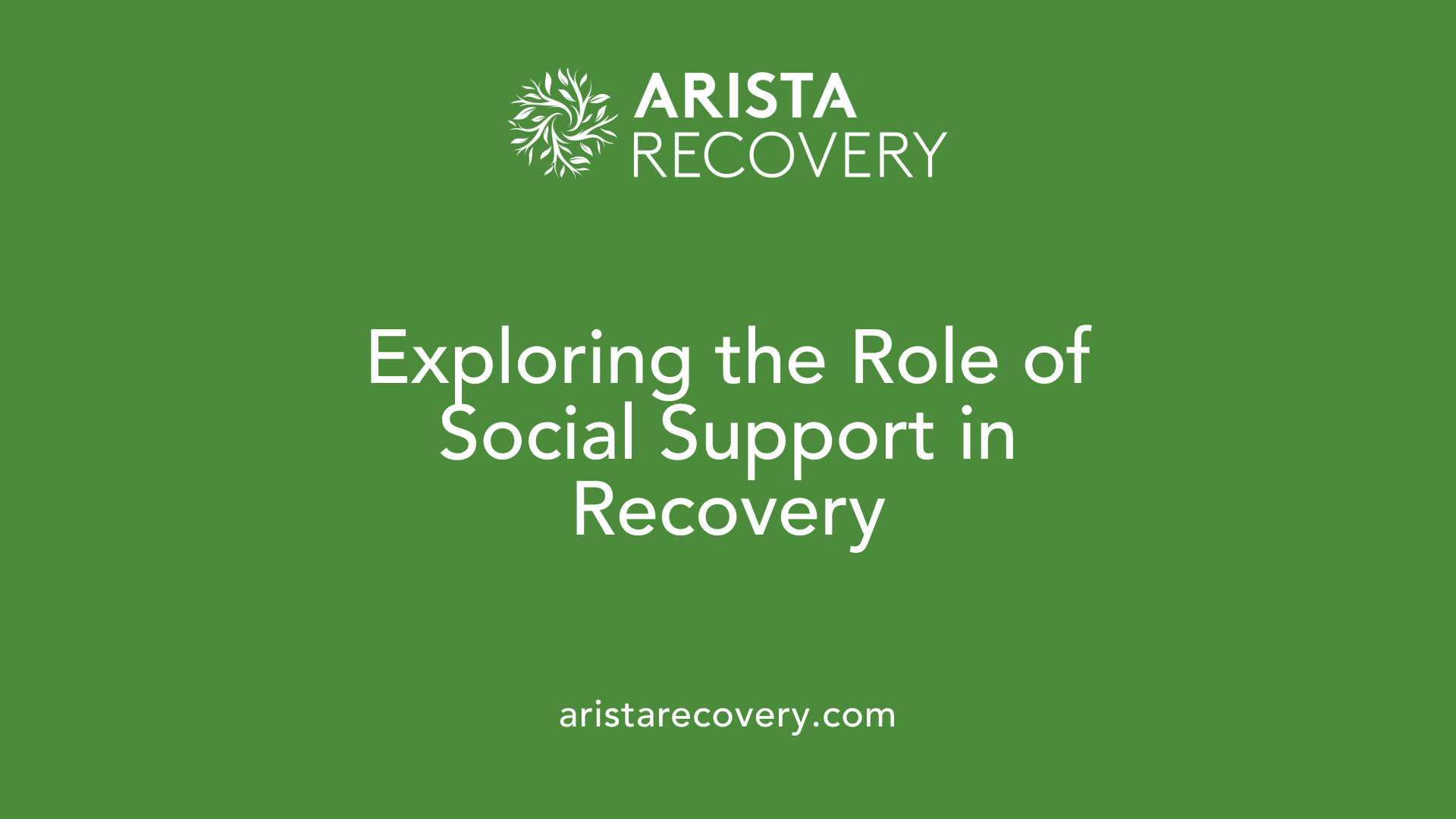
What is the role of social support in addiction recovery?
Social support plays a crucial role in addiction recovery by helping individuals feel connected and reducing feelings of isolation that often accompany substance use disorders. This support system can consist of family, friends, treatment professionals, and peer groups, providing a sense of community and shared experience.
Moreover, recovery is a holistic process that requires individuals to adopt new coping strategies and repair relationships. With encouragement and understanding from their support network, this process becomes more achievable. Given that 40% to 60% of people in recovery may relapse, ongoing support is essential for maintaining motivation and accountability.
How does peer support enhance recovery outcomes?
Peer support specifically enhances recovery by offering guidance from individuals who have personal experience with addiction. This unique form of support fosters empathy and understanding, which is vital for individuals navigating similar struggles. Active participation in peer support groups significantly predicts recovery, indicating that these groups are essential in maintaining abstinence and boosting self-efficacy among participants.
What are the benefits of shared experiences?
The benefits of shared experiences in peer support groups extend beyond emotional support. Participants often report improved coping strategies, lower relapse rates, and greater satisfaction with treatment. Engaging with peer supporters provides practical advice that can only stem from lived experiences, helping individuals identify strategies for managing cravings and challenges in their daily lives.
| Topic | Description | Benefit |
|---|---|---|
| Peer Support Definition | Nonprofessional assistance from individuals in recovery | Provides empathy and understanding |
| Role in Recovery | Encourages connection and accountability | Increases treatment retention and success |
| Shared Experiences Benefits | Practical advice and shared coping strategies | Enhances motivation and reduces isolation |
In conclusion, integrating peer support into addiction recovery not only strengthens participants’ commitment but also creates a nurturing environment conducive to sustained sobriety.
Effectiveness of Peer Support Groups and Key Benefits
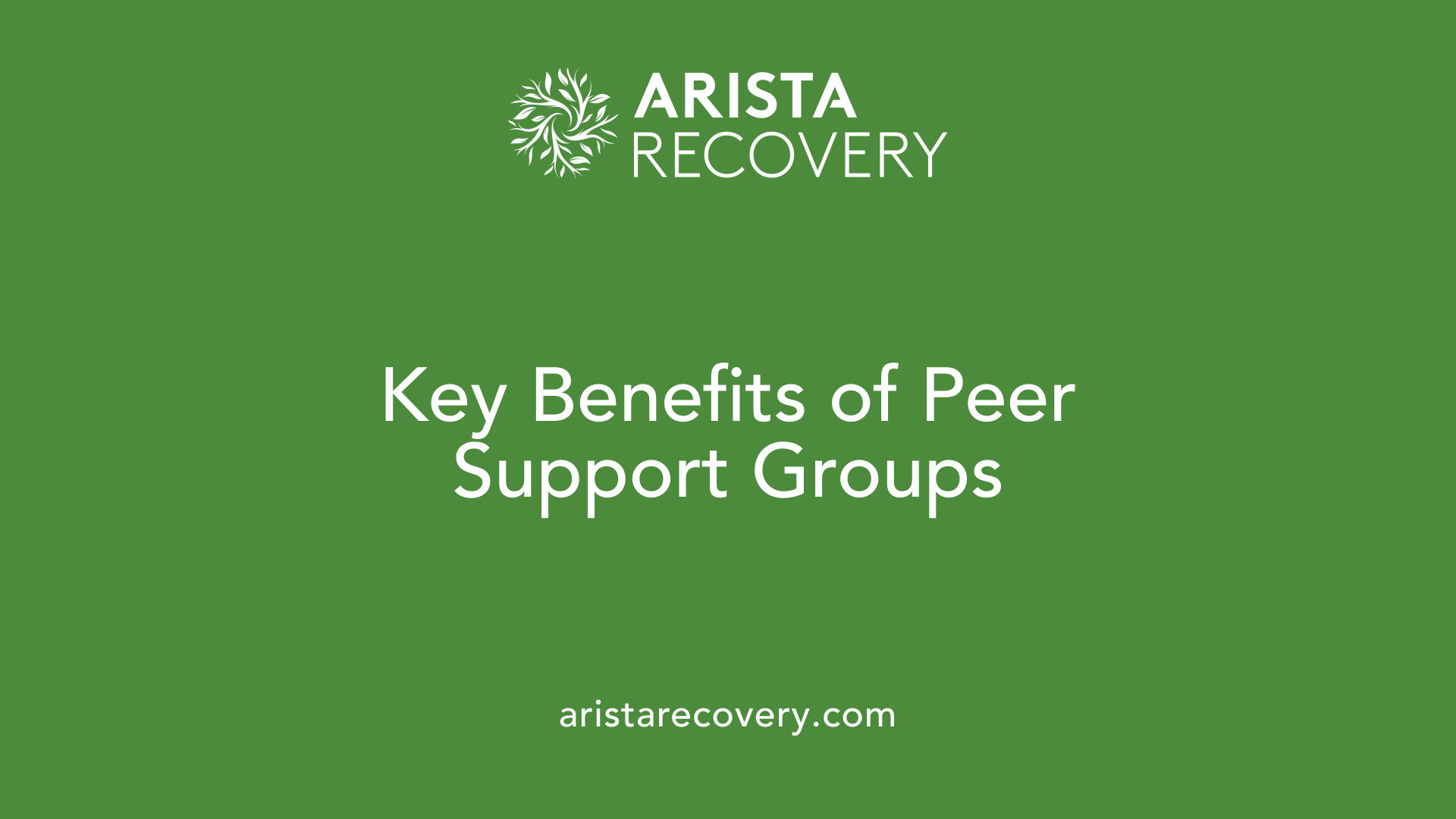
Correlation between Peer Support Groups and Sobriety
Peer support plays a significant role in fostering successful recovery outcomes for individuals struggling with addiction. Active participation in peer support groups has been shown to predict recovery, as these settings provide a communal environment that fosters accountability and motivation. Members share common experiences and support one another in their recovery journeys, thereby creating a sense of belonging that can enhance individual resilience against relapse.
Benefits such as Reduced Substance Use and Increased Treatment Engagement
The literature on peer support groups highlights numerous benefits, including reduced substance use and elevated treatment engagement. For instance, studies reveal that individuals involved in peer support initiatives are more likely to complete treatment programs successfully compared to those without such connections. Here are some of the core benefits of peer support:
- Reduced Relapse Rates: Participants gain effective coping strategies and emotional support necessary to navigate challenges during recovery.
- Increased Accountability: Regular meetings cultivate a structure that encourages members to stay aligned with their sobriety goals.
- Enhanced Motivation: The presence of peer supporters instills hope and reinforces the belief that recovery is achievable.
Peer support groups, such as Alcoholics Anonymous or SMART Recovery, offer safe spaces that diminish stigma and allow sharing of personal challenges, all of which contribute to improved self-efficacy and treatment retention.
How can Peer Support Help Reduce the Risk of Relapse?
Peer support can help reduce the risk of relapse by providing a network of individuals who share similar experiences and struggles with addiction, fostering emotional support and a sense of belonging. These support groups encourage accountability, as members commit to abstaining from substances and hold each other accountable for their recovery goals. Additionally, peer support offers practical guidance and coping strategies from those who have successfully navigated their own recovery, enhancing hope and motivation among participants. Studies indicate that involvement in peer support is associated with better treatment engagement, higher rates of abstinence, and improved social connections, which can be crucial in maintaining sobriety. Overall, peer support acts as a vital component of addiction recovery, promoting resilience and community among individuals striving for long-term sobriety.
Understanding Different Types of Peer Support
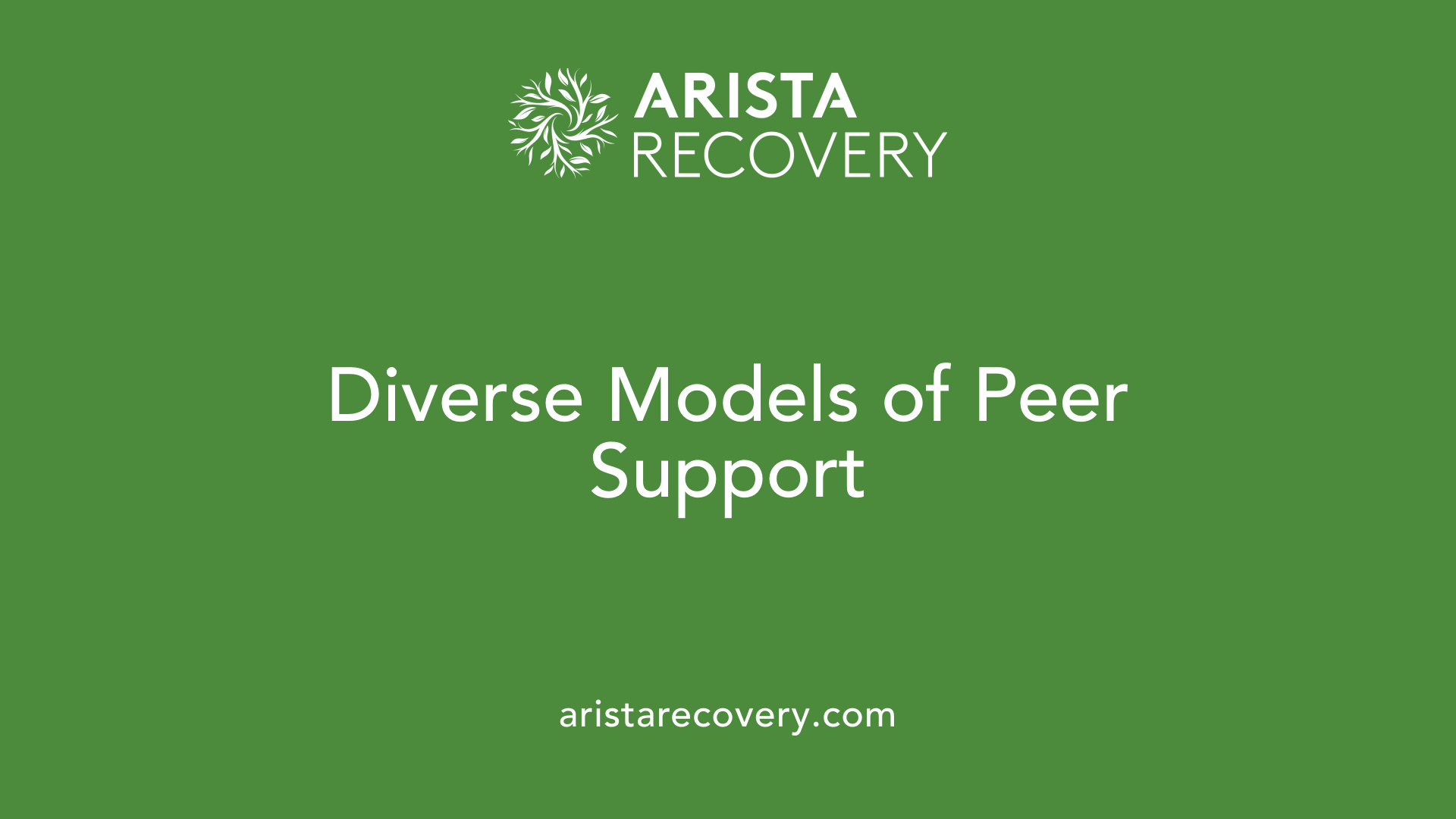
What are the four tasks of intentional peer support?
The four tasks of Intentional Peer Support include:
- Building Connection: This foundational task emphasizes creating strong, trusting relationships between peers.
- Understanding Worldviews: Participants are encouraged to explore and respect diverse perspectives, fostering a rich dialogue about individual experiences and recovery journeys.
- Redefining Help as a Mutual Learning Process: This task shifts the notion of help from a top-down approach to a collaborative learning experience, where both parties grow through shared insights.
- Moving Towards Desired Outcomes: Focused on goal-setting and personal aspirations, this task aids individuals in identifying their recovery goals and taking active steps toward achieving them.
These components underscore the collaborative and effective nature of peer support.
Various peer support models
Peer support can take various forms, each addressing unique needs within recovery:
- 12-Step Programs: This includes well-known groups like Alcoholics Anonymous (AA) and Narcotics Anonymous (NA), which emphasize shared experiences and accountability.
- Non-12-Step Approaches: These alternatives, such as SMART Recovery, focus on self-management and recovery training without the traditional 12-step framework.
- Peer Recovery Support Services: These services involve trained peers who provide nonclinical assistance, engaging individuals in shared experiences to support recovery efforts.
- Online Forums and Virtual Support: Digital platforms allow individuals to connect, share insights, and access support beyond geographical constraints.
Applications in recovery
Peer support fosters a strong sense of community and belonging essential for sustainable recovery. It helps reduce feelings of isolation and provides emotional, practical, and social support. Through connecting with peers who have navigated similar challenges, individuals can gain valuable coping strategies and accountability necessary for lasting sobriety. Each type of peer support enriches the recovery experience, thereby enhancing overall outcomes and encouraging ongoing engagement in recovery programs.
The Crucial Role of Peer Support Specialists
Responsibilities of peer support specialists
Peer support specialists play an essential role in addiction treatment settings. They leverage their own lived experiences and recovery journeys to connect with individuals facing similar challenges. These specialists provide non-judgmental guidance and emotionally supportive environments where clients can share and process their experiences.
Their responsibilities encompass various tasks:
- Advocacy: They advocate for clients, helping them access necessary resources such as housing services, employment opportunities, and mental healthcare.
- Guidance: Providing practical advice on navigating treatment challenges, including managing cravings and building healthy relationships.
- Community Building: Facilitating group activities and fostering a sense of belonging that helps diminish feelings of isolation.
- Skill Development: Assisting individuals in developing coping strategies and life skills that support sustained recovery.
Impact on treatment settings
The involvement of peer support specialists significantly enhances treatment outcomes. Studies have shown that their presence leads to improved relationships between individuals in recovery and healthcare providers, which is vital for building trust.
They effectively contribute by:
- Reducing Relapse Rates: By offering ongoing support beyond formal treatment, peer specialists help maintain sobriety and minimize relapse risks.
- Increasing Engagement: Peer support programs foster a more profound commitment to recovery, as individuals receive encouragement from those who genuinely understand their journey.
- Promoting Accountability: Regular interactions with peer support specialists develop accountability, motivating individuals to adhere to their recovery goals.
In conclusion, peer support specialists not only enhance the recovery process through their guidance and empathy but also serve as pivotal components of effective addiction treatment frameworks.
Building Stronger Support Networks
Importance of support networks
Support networks are vital in the recovery journey from addiction. They offer both emotional and practical assistance, helping individuals feel less isolated. Through shared experiences, individuals can develop a sense of belonging, which is crucial for sustaining their recovery. Peer support groups, such as Alcoholics Anonymous (AA) or SMART Recovery, create environments where participants can connect over common struggles, reducing feelings of loneliness and stigma.
Furthermore, accountability plays a significant role in these networks. Regular meetings help individuals stay focused on their goals and motivate them to adhere to their recovery plans. The presence of mentors within these groups also inspires hope, as they provide real-life examples of successful recovery.
How can individuals find suitable peer support groups during recovery?
Individuals can find suitable peer support groups during recovery by seeking recommendations from healthcare providers and utilizing online directories that list local resources. With over 500,000 support groups across the United States, options abound for those facing similar challenges. It is beneficial to look for groups that focus on shared experiences, as these create a judgment-free space for participants. Engaging in these groups can foster a sense of community and reduce feelings of isolation, and facilitators play a key role in guiding discussions and ensuring a supportive environment. Additionally, programs like Alcoholics Anonymous, SMART Recovery, and NAMI Peer-to-Peer provide structured avenues for peer support tailored to various needs.
Practical steps to build support networks
- Research Local Resources: Utilize online directories and community boards to find local peer support groups.
- Connect with Healthcare Providers: Ask therapists or counselors for recommendations on suitable groups.
- Participate Actively: Engage in multiple groups to find the best fit for your personality and needs.
- Create a Network of Support: Reach out to friends, family, or acquaintances who can join you in recovery activities.
- Maintain Consistency: Regular attendance in meetings or support groups helps solidify relationships and accountability.
Building and maintaining a support network is crucial for achieving long-term recovery and fostering a healthier lifestyle.
The Emotional and Practical Impact of Peer Support
Emotional Contributions of Peer Support
Peer support networks play a vital role in combating the feelings of isolation that often accompany addiction. Individuals in recovery often find solace in the shared experiences of their peers, which fosters a sense of belonging. This emotional connection is crucial as it provides hope and reassures participants that they are not alone in their struggles.
Moreover, peer support contributes to improved self-esteem and accountability. Regular engagement with peers allows individuals to share their journeys, empower each other, and set recovery goals together. The empathy from those who understand their challenges cultivates an environment of acceptance and validation, reinforcing motivation to stay sober.
Practical Advice from Peers
In addition to emotional support, peer supporters offer invaluable practical strategies. Through their personal experiences, they provide guidance on managing cravings, navigating triggers, and rebuilding relationships. Having someone who has faced similar challenges can make practical advice more relatable and effective.
Peer support groups also facilitate sharing coping strategies, ensuring individuals have actionable tools to maintain sobriety. This practical assistance, coupled with the supportive community, enhances the likelihood of successful recovery outcomes by addressing both emotional and practical needs concurrently.
Integration of Peer Support with Formal Therapies
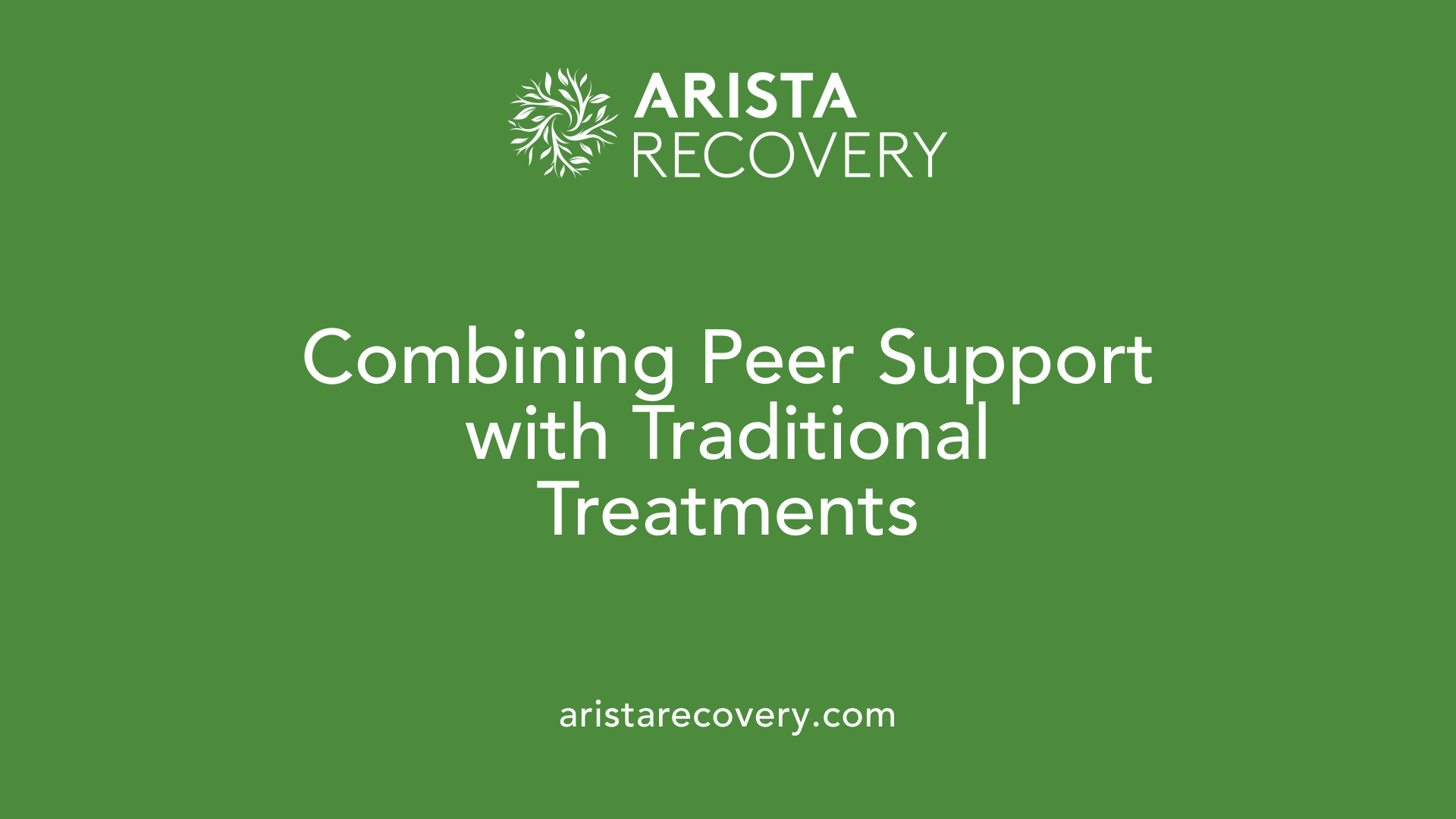
Combining Peer Support with Traditional Therapies
Integrating peer support alongside traditional addiction therapies enhances recovery outcomes significantly. While professional treatments often focus on clinical methods, peer support introduces relatability and shared experiences. This combination fosters a comprehensive approach to recovery, empowering individuals through both technical and emotional support.
Comprehensive Recovery Strategies
In practice, facilities like Harris House emphasize the synergy of peer support and formal therapy. This model encourages treatment engagement, as those in recovery find motivation and encouragement not only from therapists but from peers who understand their struggles.
Studies reveal that individuals involved in peer support programs are more likely to adhere to treatment, reduce relapse rates, and maintain long-term sobriety. This reflects an increased accountability and community motivation among participants, driving collective recovery efforts. Peer supporters connect individuals with necessary resources, assist in navigating social determinants of health, and provide ongoing guidance past formal treatment phases.
With emotional, social, and practical support offered through peer networks, individuals are better equipped to manage their recovery, bridging experiences from rehabilitation into their everyday lives. This holistic strategy fortifies the foundation of sobriety by ensuring that emotional and social challenges are addressed alongside traditional therapies.
Peer Support: Reducing Stigma and Encouraging Accountability
Addressing stigma through peer support
Peer support plays a vital role in reducing the stigma associated with addiction. When individuals share their experiences in a non-judgmental environment, it fosters a sense of acceptance and understanding. This approach helps to combat the societal stereotypes surrounding substance use disorders, thereby creating a safe space for participants to express their fears and challenges.
Peer supporters, who have navigated their own recovery journeys, can relate effectively to those currently struggling. Their presence normalizes the conversation around addiction, allowing individuals to confront denial and defensive attitudes about their situations. By openly discussing similar experiences, peers promote a culture of empathy and mutual support, which is instrumental in overcoming feelings of shame.
Accountability in group settings
The accountability that comes from participating in peer support groups significantly enhances recovery outcomes. Regular meetings create structured opportunities for individuals to set and discuss their sobriety goals. This shared commitment helps foster mutual responsibility among group members, motivating them to support each other in achieving long-term sobriety.
Moreover, the social aspect of peer support encourages active participation and sustained engagement with treatment. As members are encouraged to hold one another accountable, they are more likely to adhere to their recovery plans, thus decreasing the likelihood of relapse. Overall, peer support groups not only reduce stigma but also instill a sense of accountability that is vital for successful recovery.
Future Directions and the Need for Further Research
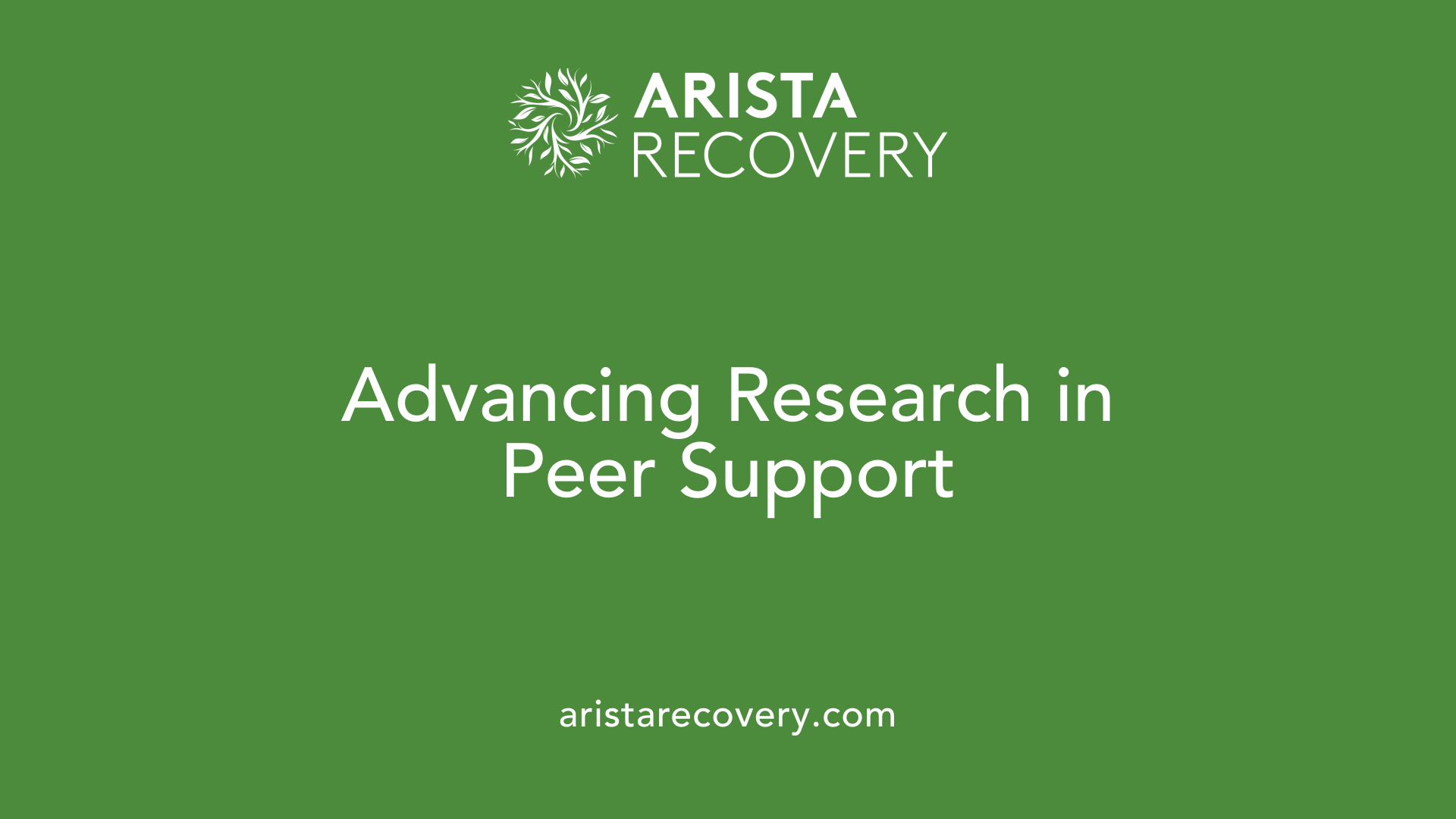
Limitations of Current Peer Support Research
Despite the promising benefits outlined in various studies, research on peer support in addiction recovery still faces limitations. Many studies included in the literature review lacked rigor, which raises questions about the reliability of their findings. The ten studies reviewed all indicated positive outcomes from peer support groups, such as reduced substance use and enhanced recovery. However, the overall quality of evidence varies, indicating that conclusions should be interpreted with caution.
Need for Comprehensive Studies
There is a pressing need for more comprehensive research that explores the nuances of peer support in addiction recovery. Future studies should focus on diverse demographic groups and different addiction types, as most existing research concentrates on common programs like Alcoholics Anonymous. Research should also evaluate the effectiveness of various peer support formats, such as online forums versus in-person meetings, to identify which modalities yield the best outcomes. Establishing empirical evidence will strengthen the argument for integrating peer support into addiction treatment plans on a broader scale.
Research could further investigate how peer support interacts with other therapeutic modalities, such as behavioral therapies and medical treatments, to create a holistic recovery framework. As the recovery landscape evolves, understanding the full impact of peer support will enhance its role and effectiveness in aiding individuals on their journey to sobriety.
Conclusion: A Community-Based Approach to Sobriety
Peer support in addiction recovery bridges the gap between personal struggle and community resilience. As individuals share experiences and support one another, they create pathways to sobriety that other recovery approaches may not offer. While peer support alone may not be a panacea, its integration with traditional therapies offers a comprehensive solution, demonstrating its invaluable role in achieving and maintaining sobriety. Building on these positive outcomes, further research and continued community engagement are essential for the evolution of peer support as an integral part of recovery frameworks.
References
- Benefits of peer support groups in the treatment of addiction - PMC
- 6 Concrete Benefits of Peer Support for Addiction
- The Importance of Peer Support in Addiction Recovery - BrightView
- Chapter 2—Roles of the Peer Worker - NCBI
- 10 Benefits of Peer Support in Addiction Recovery | All Points North
- The Role of Peer Support Workers in Treatment and Recovery
- The Role of Peer Support Specialists in Addiction Recovery
- The Role of Support Systems in Achieving Sobriety - Westwind
When mental health challenges and addiction intersect, it can feel isolating. At Arista, we offer compassionate, evidence-based, and trauma-informed care to help you heal, grow, and move forward.
You’re not alone in this.
When mental health challenges and addiction intersect, it can feel isolating. At Arista, we offer compassionate, evidence-based, and trauma-informed care to help you heal, grow, and move forward.
Support that moves with you.
You’ve taken a brave first step. At Arista Recovery, we’re here to help you continue with best-in-class care designed for long-term healing and support.
.webp)






